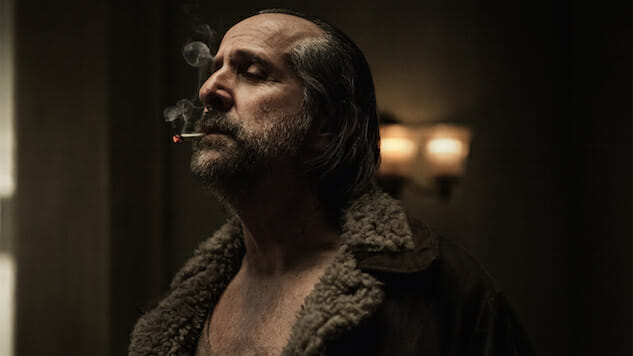In American Gods‘ “The Secret of Spoon,” the American Dream Is a Beautiful Lie
(Episode 1.02)
Starz TV Reviews American Gods
You can’t tell a story about America without looking at the horrors in its history, and how they shaped the horrors of today. In a fiery (literally) introduction, Anansi (Orlando Jones) does just that when he speaks to black men captured and stolen to America as slaves in 1679. In his speech, during the prologue of “The Secret of Spoon,” Anansi connects America’s history of slavery to modern racism and police brutality. With this coming-to-America story, American Gods emphasizes the specifically American story it’s telling.
Images of Americana appear throughout the episode: the buffalo on Shadow’s (Ricky Whittle) T-shirt, a road trip through the Midwest, shopping in a superstore, a cowboy on the cover of a romance novel. Specifically American ideas and phrases come up repeatedly—it’s no coincidence that when Media (Gillian Anderson) wants to talk to Shadow, she takes the form of Lucy in I Love Lucy, an emblem of American sitcoms. American Gods began with a black man being lynched while a crowd looked on—a particularly American horror. (Also, is no one going to address how Shadow got down from that tree?) When Shadow agrees to play checkers with Czernobog (a very effective Peter Stormare), he says that all the men are equal in checkers, making it a more American game than chess, which is ruled by kings and queens. But the eldest Zorya sister (Cloris Leachman) telling pretty lies about living a long and happy life in America might be the most American idea of all.
Anansi tells some lies himself—or, at least, not the entire truth. His story inspires the men on the ship to rebel against their captors, but it’s Anansi who ultimately benefits. When Anansi says, “At least die a sacrifice for something worthwhile,” he’s talking about himself. His motives seem more about ensuring his survival than helping any of his followers. American Gods is full of half-truths that hide who’s making what moves and for what reasons. (As Ian McShane’s Wednesday says, clues are not in the agreement.) This lack of context can be confusing, though it connects viewers with Shadow by putting them in the same position of figuring out this new world with limited knowledge.
I don’t want to tell anyone how to enjoy a TV show, but focusing on the plot in American Gods may not be the most fruitful way of watching. Instead of a story winding tighter, American Gods unspools, like the tale of an epic hero’s journey passed down over firelight. Instead of intricate plotting, the show explores feelings and themes of what it’s like to live in America from many different angles. It’s more focused on atmosphere and emotion than moving the story forward in a clear way. But that atmosphere is a lot of fun to explore.
David Slade, who directed this episode and the series premiere, does a great job creating moods within the show, which can change episode by episode, or sometimes scene by scene. In “The Secret of Spoon,” extreme closeups make everyday objects look unusual, creating a horror-like feel. (My favorite example is an image of keys turning in a lock that look like slot machine in Vegas—a symbol of another of America’s sins.) The bath Shadow takes in his hotel room turns ominous instead of relaxing when a tight shot of bubbles in the tub looks like Anansi’s many eyes. This shape is repeated throughout the episode, in the bubbles on Shadow’s floor as he is cleaning, in the coffee boiling on the stove and in the Zorya sisters’ cooking. It’s a reminder that a god’s eyes are everywhere—no matter who your god happens to be.
Shadow has gone through some horror himself, and “The Secret of Spoon” leans further into Shadow’s unease and loneliness. When Shadow is in the bath at the hotel, he is surrounded by white tiles, and when he goes to sleep that night, he is surrounded by blackness—both shots emphasizing the empty space around him, making him seem even more alone.
The despair he shows during this episode may explain why Shadow seems so calm in the face of the unknown. Shadow keeps his cool in almost any situation, even when he feels like he’s losing his mind. But Shadow isn’t necessarily going with the flow; without Laura (Emily Browning), he just doesn’t care what happens to his life. Fuck it, he’ll play a deadly game of checkers.
American Gods sure knows how to end an episode. Quick cuts between the checkerboard and Shadow’s and Czernobog’s faces, and between the game and Czernobog killing cows, make the checkers game move along quickly. Listening to Czernobog singing without seeing him move his lips—not to mention the image of him holding a bleeding hammer—adds to the creepiness of the whole affair.
Czernobog’s repeated stories of how good he is at killing cows hit on another motif of this episode: craft. Craft and skill come up a few times, like when Wednesday compliments Shadow’s craft during his coin tricks, and when Zorya Vechernyaya talks about giving the best fortunes. When Wednesday asks how good Shadow is at checkers, it hints at another specifically American idea: that if you work hard enough and get good enough, you’ll win. But Shadow loses. The American Dream may be the prettiest lie of all.
Rae Nudson is Chicago-based writer and critic whose writing has appeared in Esquire, Bright Wall/Dark Room, and Real Life, among other publications. You can follow her on Twitter @rclnudson.